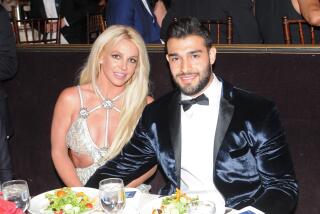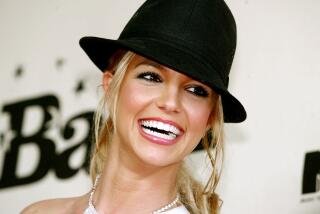What can Britney Spears do now? Buy a house. Get married. Sue those who controlled her life

She now has control over her checkbook and her uterus. She can buy a house, get married in that Versace gown she posted about on Instagram, decide when — and when not — to work.
With Los Angeles County Superior Court Judge Brenda J. Penny terminating the pop star’s high-profile, nearly 14-year conservatorship, Britney Spears can sue her parents. And there are indications she just might.
But perhaps more than anything, her public travails have highlighted how a legal tool designed to protect vulnerable people can harm as well as help.
“Britney’s case illustrated a number of clear problems that have and will impact conservatorship cases for years to come,” said Christopher Melcher, a key member of Katie Holmes’ legal team in her divorce from Tom Cruise and a prominent family and probate law expert.
“This case has highlighted the lack of due process for the person in a probate conservatorship for adults,” Melcher said. “Britney did not even know about it. The first hearing lasted 10 minutes and no testimony was taken. This was a proceeding that led her to be forbidden from removing her IUD, accessing her cell phone and remarrying.”
Melcher, who is also Kanye West’s divorce lawyer, said the process was meant for those most seriously disabled and yet Spears performed nearly 250 shows during the 13 years of conservatorship.
“It also highlighted the power of the public,” he said. “Without the Free Britney movement, none of this would have changed. It shone a spotlight on these very secretive proceedings.”
Spears’ fight for personal freedom captivated the country for months.
“This is a monumental day for Britney Spears,” Mathew Rosengart, her attorney, said when the Friday afternoon hearing ended. “Many people have asked about whether we will continue to investigate Mr. [Jamie] Spears. The answer ultimately is up to my client, Britney.”
It was a point Rosengart made repeatedly Friday, talking to reporters outside the Stanley Mosk Courthouse in downtown Los Angeles while surrounded by the star’s cheering fans: “What’s next for Britney — and this is the first time that this could be said for about a decade — is up to one person, Britney.”
Cardozo School of Law professor Leslie Salzman, who has extensively examined conservatorships and elder law, said it remains to be seen “whether Britney’s case makes long-term change to conservatorship. But this case raised the consciousness of the fundamental problems with this approach.”
Spears’ case is unique, Salzman said, because “she was out there making millions of dollars.” But it went on too long and was too restrictive, she said, when other, less inhibiting protections were available. It also showed how there is little incentive to end conservatorship of people with considerable assets.
“People learned that a court can take away the control of the most fundamental parts of a person’s life with little scrutiny,” Salzman said. “It is a system that can just roll over people, especially when they don’t get to select their own attorney.”
In fact, under the terms of the conservatorship, which began in 2008, Spears was not allowed to hire her own lawyer. Her father, with whom she had a rocky relationship, was given control over her life. During a hearing in June, she said she’d never even been told she could file a petition to end the legal arrangement.
Legal experts point to two factors that led Penny to do what Spears’ many fans had been demanding for years: Free Britney.
The first occurred during a hearing in June, when she addressed the court via phone and described the torment she had endured. She said she wasn’t allowed to have her intrauterine device removed; she wanted to have a baby and she was told no. She was forced to work grueling hours, she said, and was drugged when she disobeyed.
“OK, I’m not happy,” Spears told Penny. “I’m so angry it’s insane, and I’m depressed. I cry every day.” Instead of protecting her, she said, all the state of California seemed able to do, was hire people using her money to complicate her life.
The second factor was Penny’s decision in July to allow Spears to hire her own lawyer.
“That was the critical moment,” said Andrew Mayoras, an attorney and author who has followed Spears’ case. “One of the basic, most important rights of a conservatee is the right to hire their own attorney. She was denied that right many years ago. I think it scared her. You saw, once Mathew Rosengart was brought in, everything dramatically changed.”
In October, Rosengart asked to depose Spears’ father and made a number of discovery demands, including all documents showing “electronic surveillance” of the singer while under her father’s power, according to a 110-page court filing.
Exhibits attached to Rosengart’s filings lay out what has unfolded since the Sept. 29 hearing in which Jamie Spears was suspended as his daughter’s conservator. On Oct. 1, Rosengart requested documents and communications pertaining to “the electronic surveillance, monitoring, cloning, or recording of the activity of Britney Jean Spears’ personal telephone.”
So the Spears family saga is by no means over. But for the 39-year-old star and her lawyer, Friday was a day to celebrate.
“I’m proud of her because not only did she shine a light on this conservatorship, she shined a light on conservatorships from California to New York,” Rosengart said. “If this happened to Britney, it can happen to anybody.”
Spears did not appear at the hearing Friday, either in person or via telephone. But on Instagram, she called it the “best day ever.”
And she summed it up in a single hashtag: #FreedBritney.
More to Read
Sign up for Essential California
The most important California stories and recommendations in your inbox every morning.
You may occasionally receive promotional content from the Los Angeles Times.












